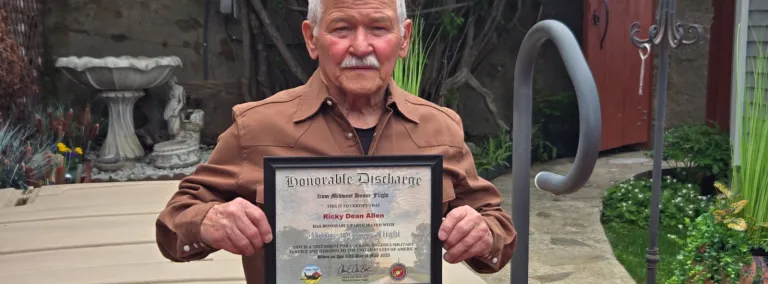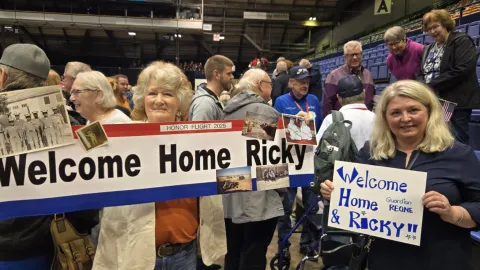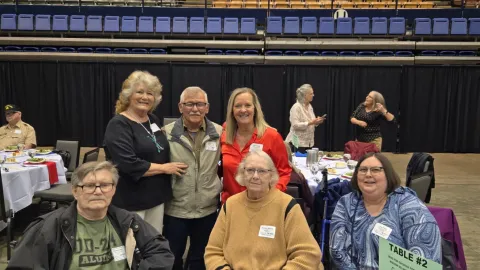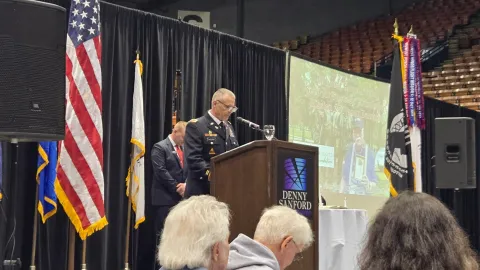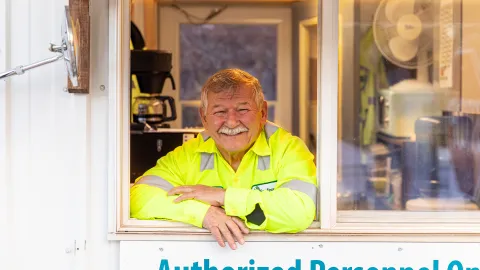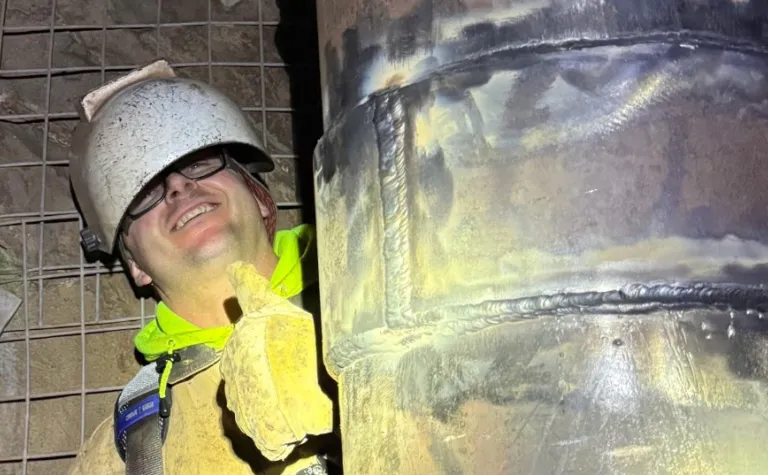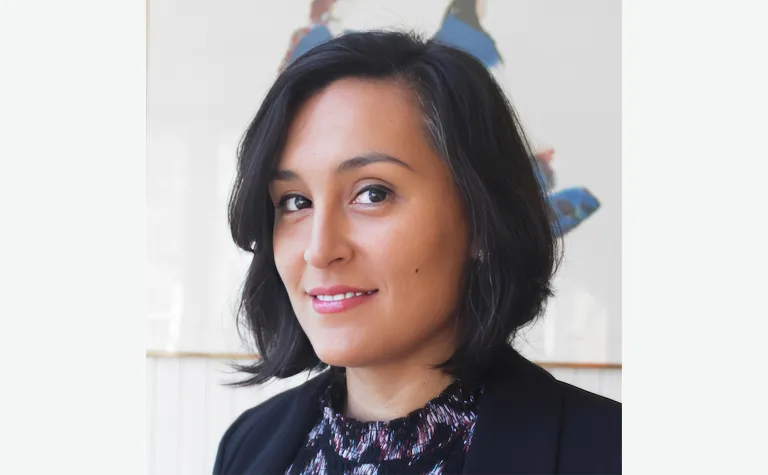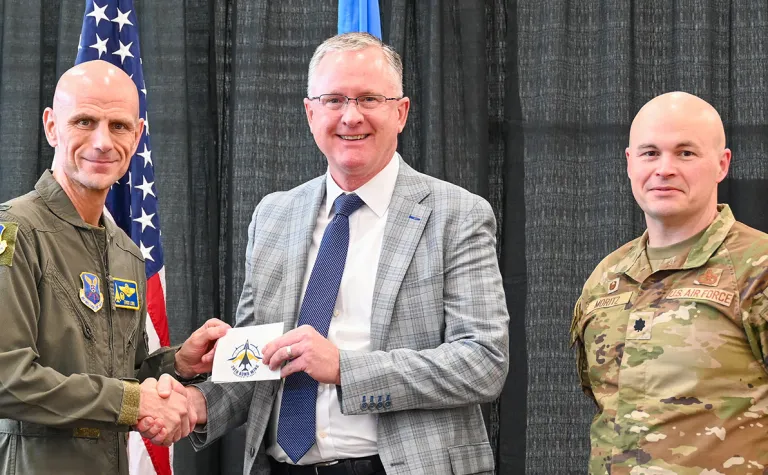Longtime employee of Homestake and SURF takes to the skies in Honor Flight
Ricky Allen, a Lead South Dakota resident who works at SURF, is among those who took part in the recent Midwest Honor Flight for veterans.
Crowds erupted with thunderous applause when Ricky Allen, who has spent many years employed at both Homestake and the Sanford Underground Research Facility, landed in Washington, D.C. People of all ages cheered and clapped as he and several other WWII, Korean War, and Vietnam veterans made their way into the airport. He had just begun his Honor Flight—an all-expenses-paid trip to the nation’s capital celebrating those who dedicated their time and lives serving the United States.
During this daytrip, the veterans were shown every war memorial in D.C., including the Marine Corps memorial, the first branch Allen served in. A South Dakota native, Allen moved to the Black Hills with his family for a short time in 1956 and instantly fell in love with the area. When his family moved back to the prairies of eastern South Dakota, he took the first opportunity to hitchhike across the state and back to the Black Hills. At only 13 years old, he began spending his summers working on a ranch in the southern Black Hills. He went on to land a job at the Homestake Mine in 1969 for $1.75 per hour. After a few years at the mine doing various jobs, he joined the Marine Corps in the middle of the tumultuous Vietnam War era.
Just as Allen’s unit was about to deploy for Vietnam, their trip was called off, and so he remained stateside during the the war. While others may have found this news relieving, it was a moment of sadness for him and his crew.
“You're telling us guys that for as hard as we trained, we can't go do our job. And so, it wasn't a relief. It was a disappointment,” Allen said.
Allen served in the Marine Corps for two years before taking an early out to return to Homestake. He later joined the National Guard as a crane operator after a few years of rest. He would complete a full career of service there—which included travling to Panama, Nicaragua, Germany, and a tour in Iraq during the start of the second Gulf War. After retiring out of the Guard, he returned home and was hired-on at the Sanford Underground Research Facility (SURF) during the lab’s early days.
For Allen, and many veterans, one of the most challenging parts of serving in combat was returning home. Allen says there is both an internal and societal expectation to stay silent about the most challenging parts of combat—this silence becomes an extension of their service. Most people have a connection to a veteran, perhaps a friend or family member, who follows this unspoken rule and does not talk about their time in combat. Veterans often see this silence as an act of protecting those loved ones back home or protecting themselves from the chaos of everyday life. At the same time, keeping these memories and emotions inside can be incredibly taxing and have a real mental toll on those who served.
Years after his time in the military, Allen ran into an old guard friend at a local retail store, Brian Maschino. Maschino and his wife, Kim, help operate the Midwest Honor Flight organization. The pair work alongside Aaron Van Beek who serves as the Board President and CEO for the organization. Brian Maschino serves as Chief Warrant Officer and his wife as an active Lieutenant Colonel in the South Dakota National Guard. Maschino urged Allen to sign up for the flight.
“He pulls that card out of his pocket and he said, ‘Rick, I ain't talking to you again. Call this number.’ Yes, sir. And I called it.”
That simple conversation landed Allen on the waitlist for Midwest Honor Flight. Space on the flight is limited, so veterans of earlier wars, terminally ill vets, and whoever signed up earliest are given priority. Expecting a much longer wait, he was able to get in nearly a year ahead of schedule.
Allen emphasized that not all those who served are privileged enough to receive the honor flight. His own brother, Darl, is one example. Darl passed from exposure to Agent Orange after serving in the Vietnam War. Allen explained how some veterans of the Vietnam War era, like him and his brother, returned home to mass scrutiny and criticism.
“My brother had a bad time when he came home. He was treated really bad and rejected by the VA,” said Allen.
The Midwest Honor Flight serves not only as a celebration of veterans and their service, but also as a moment of healing and acceptance for those like Allen and his brother.
“I guess I was so disappointed in the way America treated Vietnam vets, and the way my younger brother was treated. I was really disappointed in the way he was treated all the way until the day died. And so, he was with me on that flight.”
Allen is grateful for his opportunity to experience an honor flight and is thankful for the closure it can offer veterans like himself and others.
“There's some acceptance there that, ‘okay, let's carry on.’ You know, move ahead. That's all we can do,” he stated.
The day before the Honor Flight, Allen and his wife, Franny, drove to Sioux Falls for an overnight stay at the Sheraton Hotel. The next morning, Allen bid goodbye to his spouse and embarked on his journey.
Every veteran is given a personal escort throughout the flight—someone to watch over and help make the experience memorable. Allen praised his escort, Reone Ullom, saying, “And my escort was fantastic.”
The veterans began their tour with a trip to Arlington National Cemetery and a visit to each of the war and military memorials, where South Dakota representative Dusty Johnson and senator Mike Rounds were in attendance.
Of all the sites visited, Allen’s favorite was the Korean War memorial, which features photos of Korean War veterans etched into a wall of black marble.
“Those pictures were taken from photos of people that were in Korea—MASH units, Air Force, no matter who, even in the South Korean army, all of them, and just it looks so surreal. It was unbelievable,” Allen said.
After completing their itinerary and tour of the nation’s capital, the veterans were given a touching farewell on the flight home: a final mail call. In the military, mail call is an important event in which personnel gather to receive letters and gifts. This final mail call harkened back to those times. Veterans on the flight received letters from friends, family members, community members, and others thanking them for their service. Allen recounted the experience, emphasizing its emotional effect on the veterans.
“And I think it touched everybody on that plane. In fact, I know it did,” he said.
They returned to Sioux Falls with an unforgettable crowd of 1,200 people gathered to welcome them home, as well as a Marine Corps escort back to the hotel, where they concluded their Honor Flight with a final meal.
Allen recommended the experience to other veterans, saying, “The Honor Flight was healing, and it was an awakening—for a whole lot of people. For myself, and hopefully for my younger brother.”
The sponsor of Midwest Honor Flight #25 was Seed for Success out of Sioux Falls.
